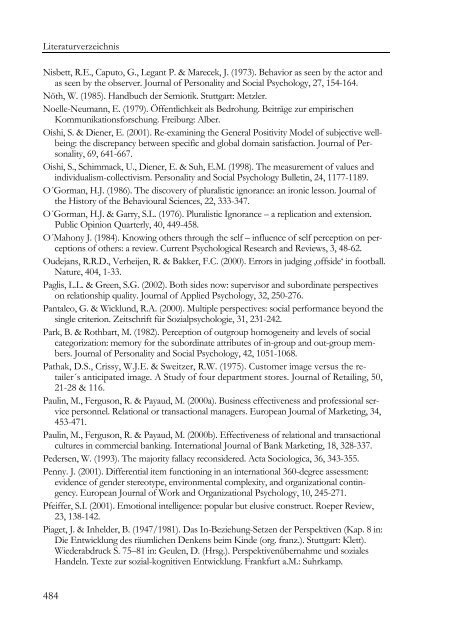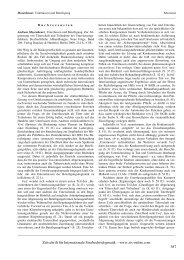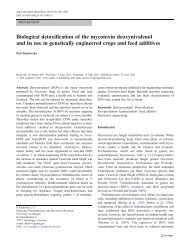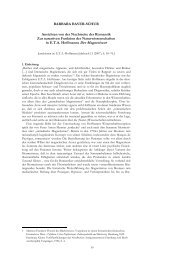- Seite 3 und 4:
Micha Strack Sozialperspektivität
- Seite 5 und 6:
Micha Strack Sozialperspektivität
- Seite 7 und 8:
Inhaltsverzeichnis 1 Einleitung 1 1
- Seite 9 und 10:
1 Einleitung 1.1 Perspektivität al
- Seite 11 und 12:
Kapitel 1 1947/1981:80), gelingt ä
- Seite 13 und 14:
Kapitel 1 von E.H. Weber ausführli
- Seite 15 und 16:
Kapitel 1 Beziehungen auch in markt
- Seite 17 und 18:
Kapitel 1 Subjektiver Theorien, Nor
- Seite 19 und 20:
Kapitel 1 deutlich zu weit. In der
- Seite 21 und 22:
Kapitel 1 tivendiskrepanzen hier im
- Seite 23 und 24:
Kapitel 1 Konsens) dem Konsens selb
- Seite 25 und 26:
Kapitel 1 „Wir haben zwar alle de
- Seite 27 und 28:
Kapitel 1 Die zweite Begründung f
- Seite 29 und 30:
Kapitel 1 Aufbereitung angemessener
- Seite 31 und 32:
1.3 Das ,Problem des Fremdpsychisch
- Seite 33 und 34:
Kapitel 1 situations and their mann
- Seite 35 und 36:
Kapitel 1 Der Simulationsansatz mit
- Seite 37 und 38:
2 Was denken die Anderen? Konsens o
- Seite 39 und 40:
Kapitel 2 gruppe ließ sich eine mi
- Seite 41 und 42:
Kapitel 2 perspektivisch differenzi
- Seite 43 und 44:
Kapitel 2 P[O[P]] deutet darauf hin
- Seite 45 und 46:
Kapitel 2 und somit nur das Ausmaß
- Seite 47 und 48:
Kapitel 2 bach 1955). Für Studie I
- Seite 49 und 50:
Kapitel 2 scheidung oder Meinung zu
- Seite 51 und 52:
Kapitel 2 nun jeweils negativ mit d
- Seite 53 und 54:
Kapitel 2 Abb. 2_8 zeigt die Zerleg
- Seite 55 und 56:
Kapitel 2 sowie eben auch bspw. Mit
- Seite 57 und 58:
Kapitel 2 gie die „preparedness f
- Seite 59 und 60:
Kapitel 2 „Because both groups wa
- Seite 61 und 62:
Kapitel 2 Auch in sozialwissenschaf
- Seite 63 und 64:
Kapitel 2 gegen die Unterstellung m
- Seite 65 und 66:
Kapitel 2 Normen sind nicht nur Fol
- Seite 67 und 68:
Abb. 2_14: Pfadanalytische Darstell
- Seite 69 und 70:
Kapitel 2 Varianzeinschränkung in
- Seite 71 und 72:
Kapitel 2 Abb. 2_16: In Leitungspos
- Seite 73 und 74:
Kapitel 2 Targets beschreiben 31.
- Seite 75 und 76:
Kapitel 2 klärung dies zu entkräf
- Seite 77 und 78:
Kapitel 2 Abb. 2_21: Anker-Adjustie
- Seite 79 und 80:
Kapitel 2 Presson et al. (1984, z.n
- Seite 81 und 82:
Kapitel 2 sich die befragte Person
- Seite 83 und 84:
Kapitel 2 Consensus, wenn andere mi
- Seite 85 und 86:
Kapitel 2 nötig. In der Innensicht
- Seite 87 und 88:
Kapitel 2 Vergleich zu den meisten
- Seite 89 und 90:
Kapitel 2 eine Generalisierbarkeit
- Seite 91 und 92:
Kapitel 2 2.2 Akzentuierende Perspe
- Seite 93 und 94:
Kapitel 2 Bereits die Anzahl der Ze
- Seite 95 und 96:
Kapitel 2 bereits vor, wenn sich im
- Seite 97 und 98:
Kapitel 2 die Perspektive von Perso
- Seite 99 und 100:
Kapitel 2 In der Sozialwissenschaft
- Seite 101 und 102:
Kapitel 2 anz (Pedersen 1999:347),
- Seite 103 und 104:
Kapitel 2 Psychologische Nähe und
- Seite 105 und 106:
Kapitel 2 Individuierung und Kontak
- Seite 107 und 108:
Kapitel 2 legt, Batson et aal. 1997
- Seite 109 und 110:
Kapitel 2 damit die Ingroup-Homogen
- Seite 111 und 112:
Kapitel 2 Die eigene Meinung der Be
- Seite 113 und 114:
Prozentanteil dispositionaler Begr
- Seite 115 und 116:
Kapitel 2 penebene wie bei De La Ha
- Seite 117 und 118:
Kapitel 2 „…social discriminati
- Seite 119 und 120:
Gross & Miller (1997) bringen die E
- Seite 121 und 122:
Kapitel 2 gefährdeter Jugendlicher
- Seite 123 und 124:
Kapitel 2 Mehrheit) als mit den obj
- Seite 125 und 126:
Kapitel 2 anfechtbar bleibt m.E. im
- Seite 127 und 128:
Kapitel 2 Andere Autoren früher St
- Seite 129 und 130:
Kapitel 2 Nach der soziologischen A
- Seite 131 und 132:
Kapitel 2 überwiegt69 , wird nachd
- Seite 133 und 134:
Kapitel 2 die Opponenten der zuletz
- Seite 135 und 136:
Kapitel 2 vistische‘, sie allein
- Seite 137 und 138:
Kapitel 2 jeweils untersuchten Hypo
- Seite 139 und 140:
Kapitel 2 Bestandteile in Abb. 2_41
- Seite 141 und 142:
Wenn eine Perspektivendiskrepanz ei
- Seite 143 und 144:
Abb. 2_46: Skizze IV zur Diskrepanz
- Seite 145 und 146:
Kapitel 2 2.4 Das Zufriedenheitspar
- Seite 147 und 148:
Kapitel 2 s.u.) und die Wahl von so
- Seite 149 und 150:
Kapitel 2 Befunde (z.B. Colvin, Blo
- Seite 151 und 152:
- Wirkung + Kapitel 2 Lineare Model
- Seite 153 und 154:
Kapitel 2 Itemformulierung in 1. Pe
- Seite 155 und 156:
Kapitel 2 Durch die für die Durchf
- Seite 157 und 158:
Kapitel 2 Vor einem Erklärungsvers
- Seite 159 und 160:
Tab. 2_6: Ergebnisse der Studie IVa
- Seite 161 und 162:
Kapitel 2 False Uniqueness hergeste
- Seite 163 und 164:
Kapitel 2 Die Ergebnisse der in Abb
- Seite 165 und 166:
Kapitel 2 werden. Eine Moderation d
- Seite 167 und 168:
Kapitel 2 oder über eine Umdeutung
- Seite 169 und 170:
Kapitel 2 In Studie IVc wurde zusä
- Seite 171 und 172:
Kapitel 2 Stattdessen ergeben sich
- Seite 173 und 174:
Vermutete Kollegenzufriedenheit (ab
- Seite 175 und 176:
3 Perspektiven im Raum komplementä
- Seite 177 und 178:
Kapitel 3 kognitive Mechanismen ver
- Seite 179 und 180:
Kapitel 3 sozialer Verpflichtung f
- Seite 181 und 182:
Kapitel 3 Die Wahrnehmung, die Pers
- Seite 183 und 184:
Kapitel 3 unmoralisch abgewerteten
- Seite 185 und 186:
Kapitel 3 kontinuums bei Sherif & H
- Seite 187 und 188:
Kapitel 3 76 Studierende nahmen an
- Seite 189 und 190:
Kapitel 3 den faktischen Konsens zw
- Seite 191 und 192:
Kapitel 3 reagieren können. Auch d
- Seite 193 und 194:
Kapitel 3 Dimensionsladungen: Sozia
- Seite 195 und 196:
1,0 ,8 ,6 ,4 ,2 -,0 -,2 -,4 -,6 -,8
- Seite 197 und 198:
Kapitel 3 Der Interaktionsterm Pers
- Seite 199 und 200:
Kapitel 3 Resümieren lässt sich,
- Seite 201 und 202:
Kapitel 3 Der Personzentrierte Ansa
- Seite 203 und 204:
Abb.3_18: Faktorraum der acht bipol
- Seite 205 und 206:
,75 ,50 ,25 0,00 -,25 -,50 -,75 -,7
- Seite 207 und 208:
Abb. 3_22: Interaktionseffekt zum V
- Seite 209 und 210:
Kapitel 3 Beruflich-professionelle
- Seite 211 und 212:
Bank B Abb. 3_23: Design der Studie
- Seite 213 und 214:
Kapitel 3 Ähnlichkeit, Komplementa
- Seite 215 und 216:
Kapitel 3 kulturen liegen vor (Schm
- Seite 217 und 218:
Selbstbestimmungs/ Werte 1.0 .5 0.0
- Seite 219 und 220:
Kapitel 3 weiterempfohlen: - t ° K
- Seite 221:
Abb. 3_30: Illustration der Werteä
- Seite 224 und 225:
Kapitel 4 4.1 Sozialperspektivische
- Seite 226 und 227:
Kapitel 4 Zielspannung aufbauen und
- Seite 228 und 229:
Kapitel 4 Plänen gestört, wenn er
- Seite 230 und 231:
Kapitel 4 Abb. 4_2: Gruppendynamik
- Seite 232 und 233:
Kapitel 4 Einigkeitsgefühl zu verm
- Seite 234 und 235:
Kapitel 4 experimentellen Ergebniss
- Seite 236 und 237:
Kapitel 4 Durch Kombination der Vor
- Seite 238 und 239:
Kapitel 4 Entwicklung durch Survey-
- Seite 240 und 241:
Kapitel 4 Feedback-Einzelfallstudie
- Seite 242 und 243:
Kapitel 4 Durch Einzelfallstudie IX
- Seite 244 und 245:
Kapitel 4 Perspektivenlokationen sc
- Seite 246 und 247:
Kapitel 4 Erwartungskonform nimmt R
- Seite 248 und 249:
Kapitel 4 einiger für die Identifi
- Seite 250 und 251:
Kapitel 4 der abgebildeten Images d
- Seite 252 und 253:
Kapitel 4 Von den 18 Diskrepanzdrei
- Seite 254 und 255:
Kapitel 4 differenzierung (Elevatio
- Seite 256 und 257:
Kapitel 4 Das Social-Relations-Mode
- Seite 258 und 259:
Kapitel 4 anteil auf das doppelte (
- Seite 260 und 261:
Kapitel 4 Über Kennys Auffassung d
- Seite 262 und 263:
Kapitel 4 Die Metaperspektive und d
- Seite 264 und 265:
Kapitel 4 Wissen bleibt für Funder
- Seite 266 und 267:
Kapitel 4 Methodik der SOREMO-Analy
- Seite 268 und 269:
Kapitel 4 In Studienserie IX geht d
- Seite 270 und 271:
Kapitel 4 Abb. 4_12: Perspektivenre
- Seite 272 und 273:
Kapitel 4 Abb. 4_13: Perspektivenre
- Seite 274 und 275:
Kapitel 4 von Selbstbild und Metape
- Seite 276 und 277:
Kapitel 4 Erwartungskonform übertr
- Seite 278 und 279:
Kapitel 4 4.2 Perspektivität der F
- Seite 280 und 281:
Kapitel 4 Sinn vermitteln können (
- Seite 282 und 283:
Kapitel 4 Das Gesagte gilt dabei ni
- Seite 284 und 285:
Kapitel 4 Auch in den inhaltlichen
- Seite 286 und 287:
Kapitel 4 Für die Sozialperspektiv
- Seite 288 und 289:
Kapitel 4 Werden die Rollen als div
- Seite 290 und 291:
Kapitel 4 gleich wahrgenommen (Abb.
- Seite 292 und 293:
Kapitel 4 Rational Goal Orientierun
- Seite 294 und 295:
Kapitel 4 sensitivity to the expect
- Seite 296 und 297:
Kapitel 4 Veröffentlichungen zielt
- Seite 298 und 299:
Kapitel 4 Selbstwert-Regulierung d
- Seite 300 und 301:
Kapitel 4 Befund der generellen Sel
- Seite 302 und 303:
Kapitel 4 einer Reihenfolge motivat
- Seite 304 und 305:
Kapitel 4 da in Abb. 4_27 vor allem
- Seite 306 und 307:
Kapitel 4 mit dem Mittelwerts- oder
- Seite 308 und 309:
Kapitel 4 Das Broker- und Innovator
- Seite 310 und 311:
Kapitel 4 ihrer Führungskraft und
- Seite 312 und 313:
Kapitel 4 ,0 304 VG FK*[FK] Peers ,
- Seite 314 und 315:
Kapitel 4 Die exemplarischen Ergebn
- Seite 316 und 317:
Kapitel 4 individuelle Verhaltensbe
- Seite 318 und 319:
Kapitel 4 Während in Kennys Person
- Seite 320 und 321:
Kapitel 4 Tab. 4_13: Differentielle
- Seite 322 und 323:
Kapitel 4 für den Skalenwert ∅ 2
- Seite 324 und 325:
Kapitel 4 gefunden, insbesondere wi
- Seite 326 und 327:
Kapitel 4 Das erwartungskonträr po
- Seite 328 und 329:
Kapitel 4 Vorjahreswerts eingefrore
- Seite 330 und 331:
Kapitel 4 Auf die Verbesserung der
- Seite 332 und 333:
Kapitel 4 sich konsistente Korrelat
- Seite 334 und 335:
Kapitel 4 logischen Gründen ergibt
- Seite 336 und 337:
Kapitel 4 328 Vorstand V. Bereichse
- Seite 338 und 339:
Kapitel 4 negative, die als Arrogan
- Seite 340 und 341:
Kapitel 4 sozial-normative Impressi
- Seite 342 und 343:
Kapitel 4 Bisher konnten zwei Unter
- Seite 344 und 345:
Kapitel 4 Während Gesamtwerte in d
- Seite 346 und 347:
Kapitel 4 .26). Auch in der großen
- Seite 348 und 349:
Kapitel 4 metaperspektivische Beurt
- Seite 350 und 351:
Kapitel 4 werden, evtl. Egozentrizi
- Seite 352 und 353:
Kapitel 4 unipsatierten Items des C
- Seite 354 und 355:
Kapitel 4 korreliert, könnte der D
- Seite 356 und 357:
Kapitel 4 Ob sich im Koeffizienten
- Seite 358 und 359:
Kapitel 4 Aus Abb. 4_51 ist bekannt
- Seite 360 und 361:
Kapitel 4 Daraus folgt auch, dass s
- Seite 362 und 363:
Kapitel 4 Führungskräften vor, di
- Seite 364 und 365:
Kapitel 4 ≥ .03), von der Zurück
- Seite 366 und 367:
Kapitel 4 4.3 Zwischenbilanz und Au
- Seite 368 und 369:
Kapitel 4 Perspektive). Ebenso werd
- Seite 370 und 371:
Kapitel 4 Bewerbungsverfahren liefe
- Seite 372 und 373:
Kapitel 4 Bedingungen im Allgemeine
- Seite 374 und 375:
Kapitel 4 Abb. 4_73: Von Finanzbera
- Seite 377 und 378:
5 Sozialperspektivische Imagepositi
- Seite 379 und 380:
Kapitel 5 metaperspektivische Antiz
- Seite 381 und 382:
Kapitel 5 später Studie Xc). Zweit
- Seite 383 und 384:
Abb. 5_2: Beurteilung einer Bank du
- Seite 385 und 386:
Kapitel 5 Tab. 5_1: Mittlere Benotu
- Seite 387 und 388:
Kapitel 5 dritten vermutete Meinung
- Seite 389 und 390:
Kapitel 5 vom selbstüberschätzend
- Seite 391 und 392:
Kapitel 5 Positiven Aussagen zu Lei
- Seite 393 und 394:
Kapitel 5 inakkurate Vermutung der
- Seite 395 und 396:
Kapitel 5 dem Hintergrund der Theor
- Seite 397 und 398:
Kapitel 5 „However, whereas banke
- Seite 399 und 400:
Kapitel 5 5.2 Pilotstudie XII zur A
- Seite 401 und 402:
Kapitel 5 Die Validität des Wettbe
- Seite 403 und 404:
Kapitel 5 5.3 Studienserie XIII zur
- Seite 405 und 406:
Tab. 5_3: BtC und BtB - Kundenbezie
- Seite 407 und 408:
Kapitel 5 werden Kunden vermutlich
- Seite 409 und 410:
Kapitel 5 schungsgebiete (z.B. Gode
- Seite 411 und 412:
Kapitel 5 Interaktionsterm von Send
- Seite 413 und 414:
Kapitel 5 Führungskräfte und Vert
- Seite 415 und 416:
Kapitel 5 geteilten Überzeugungen
- Seite 417 und 418:
Kapitel 5 5.3.3 Branchenvergleiche
- Seite 419 und 420:
Kapitel 5 Valenz-Orthogonalität? W
- Seite 421 und 422:
,8 ,6 ,4 ,2 0,0 -,2 -,4 -,6 -,8 -,8
- Seite 423 und 424:
Kapitel 5 Organisationskulturkreis
- Seite 425 und 426:
Kapitel 5 Abb. 5_23: Perspektivenve
- Seite 427 und 428:
Kapitel 5 diagnostik eben auch von
- Seite 429 und 430:
Kapitel 5 Das Preis-Leistungs-Dilem
- Seite 431 und 432:
Kapitel 5 in etwa der, die die CZ-K
- Seite 433 und 434:
Kapitel 5 tatsächlich haben nur si
- Seite 435 und 436:
Kapitel 5 Anbietersicht mit der der
- Seite 437 und 438:
Kapitel 5 Abb. 5_32: Die Anbieter-W
- Seite 439 und 440:
Abb. 5_33: Die Anbieter-Wettbewerbe
- Seite 441 und 442: Abb. 5_37: Allgemeinpsychologische
- Seite 443 und 444: Kapitel 5 (∅r(A[K[x]],K[x]) ≤0
- Seite 445 und 446: Kapitel 5 personalisierteren Leistu
- Seite 447: Kapitel 5 Perspektivendiskrepanz-Re
- Seite 450 und 451: Kapitel 6 psychologischen Grundlage
- Seite 452 und 453: Kapitel 6 verschieden sein, dass si
- Seite 454 und 455: Kapitel 6 Die Möglichkeit, die Kom
- Seite 456 und 457: Kapitel 6 2000:73ff): (1) Wahrschei
- Seite 458 und 459: Kapitel 6 asymmetrie zurück denken
- Seite 460 und 461: Kapitel 6 Die Perspektivenübernahm
- Seite 462 und 463: Kapitel 6 Effekt instrumentalisiert
- Seite 464 und 465: Kapitel 6 Die Ermittlung von Voraus
- Seite 466 und 467: Kapitel 6 und Akzentuierungs-Konseq
- Seite 468 und 469: Kapitel 6 Teamentwicklung gut etabl
- Seite 470 und 471: Kapitel 6 Perspektive des Kunden be
- Seite 473 und 474: Literaturverzeichnis Adams, A., Boc
- Seite 475 und 476: Literaturverzeichnis Blickle, G. (1
- Seite 477 und 478: Literaturverzeichnis Chandler, M.J.
- Seite 479 und 480: Literaturverzeichnis Fassheber, P.
- Seite 481 und 482: Literaturverzeichnis Frith, U. & Fr
- Seite 483 und 484: Literaturverzeichnis Harris, L.C. &
- Seite 485 und 486: Literaturverzeichnis Huguet, P., Ch
- Seite 487 und 488: Literaturverzeichnis Krueger, J. &
- Seite 489 und 490: Literaturverzeichnis McCrae, R.R. &
- Seite 491: Literaturverzeichnis Mummendey, A.
- Seite 495 und 496: Literaturverzeichnis Schmitt, M., M
- Seite 497 und 498: Literaturverzeichnis Stasser, G. &
- Seite 499 und 500: Literaturverzeichnis Trommsdorff, V
- Seite 501: Literaturverzeichnis Wolfson, S. (2
- Seite 504 und 505: Abbildungs- und Tabellenverzeichnis
- Seite 506 und 507: Abbildungs- und Tabellenverzeichnis
- Seite 508 und 509: Abbildungs- und Tabellenverzeichnis
- Seite 510 und 511: Abbildungs- und Tabellenverzeichnis
- Seite 512 und 513: Abbildungs- und Tabellenverzeichnis
- Seite 514 und 515: Abbildungs- und Tabellenverzeichnis
- Seite 516 und 517: Abbildungs- und Tabellenverzeichnis
- Seite 518 und 519: Zusammenfassung In der bisher verst
- Seite 520 und 521: Zusammenfassung gens entwickelten F
- Seite 522 und 523: Zusammenfassung Methode der Wahl. I
- Seite 526: Danksagung Mein akademischer Lehrer
















